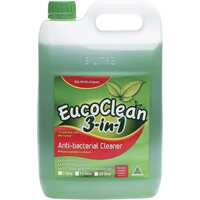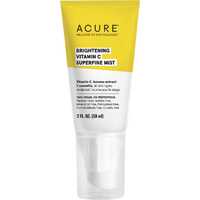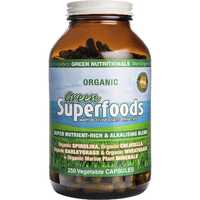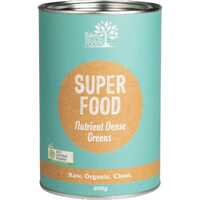Living a healthy natural life can be much easier than you think. Beyond unrealistic fitness regimes and highly edited Instagram photos, health and well-being is about making simple choices every single day. From the foods you eat to the beauty products you apply and household items you use, everything has a role to play. More often than not, a healthy lifestyle is the culmination of repeated lifestyle choices. With good intentions and mindful actions, you can transform your life by paying attention and developing positive habits.
Everyday items can make a real difference to your health and well-being. Let's take a comprehensive look at everything you come into contact with during a typical day — from what you put into your body to what you put on your body and the cleaning products used in your home.
Food & Drink Products — What You Put Into Your Body
Food choices have a huge impact on your health and well-being. From big meals to small snacks and water intake, everything you put into your body is important. Healthy eating is not about following unrealistic diets or avoiding all the tasty things you love so much — it's about paying attention to what you eat and making good choices on a repeated basis. While you don't have to be perfect, you do have to make smart decisions and stay consistent over time.
Regardless of your age, gender, or health status, the following information is great advice for anyone:
Water intake
Water has a massive impact on your health. After all, human beings consist of 50%-80% H2O, depending on conditions. Water carries nutrients to your cells, transports oxygen to your brain, and helps the body to absorb vitamins, minerals, amino acids, and glucose. It also helps to regulate your body temperature and plays a cleansing role by flushing out toxins and waste.
When it comes to water consumption, it's important to think about quantity and quality. First and foremost, you need to drink enough water to help your body function. Men need to drink roughly 10 cups of fluids a day, and women are advised to consume 8 cups. Along with water itself, you can get these fluids from fruit juices, flavoured drinks, tea, and coffee.
If you don't get enough water, there's a greater risk of developing kidney stones, experiencing heart valve problems, and suffering some forms of cancer. Even minor dehydration can affect physical and mental performance, so it's important to drink enough water each and every day. While tea and coffee do contribute to your fluid intake, too much caffeine or alcohol will lead to dehydration.
Along with quantity, you should try to drink good quality water to maximise the impact of your fluid intake. While standard tap water is pretty good in Australia, water filters help to remove chemicals, chlorine, fluoride, and other unwanted pollutants and additives. When buying a water filter, it's important to check the details to see which particles are removed. Despite issues with plastic production and water monopolisation, many bottled water products also provide a relatively pure source of H2O.
Food consumption
The foods you eat play a huge role in your overall health and well-being. From breakfast fruits to midnight snacks, everything you consume plays some sort of role. According to the Australian Dietary Guidelines, people should eat from the following five food groups every day.
- Vegetables - different types and colours
- Fresh fruit
- Grain foods (breads, cereals, rice, pasta, oats, quinoa, and barley)
- Lean meats and poultry (fish, eggs, tofu, nuts, seeds, legumes, beans)
- Dairy products (milk, yoghurt, cheese, and milk)
While this advice is generally good, vegetarians and vegans can access meat and dairy substitutes from other food sources. Eating a healthy meat-free diet may seem complicated at times, but for lots of people, it offers a range of ethical, health, and environmental advantages. Along with eating good healthy foods, it's also important to limit your intake of poor quality foods.
Based on dietary guidelines, it's important to limit your consumption of the following foods:
- Foods high in saturated fats
- Foods and drinks containing added salt
- Foods and drinks containing added sugars
- Alcohol intake
Many health and dietary guidelines mention the vitamin and mineral content of different foods. While this can be useful at times, people eat whole foods rather than specific nutrients. For this reason, it makes sense to focus on particular foods or types of food rather than specific nutrients. Saying that, specific dietary models can provide useful recommendations regarding the daily intake of vitamins, minerals, and macronutrients.
More than anything else, scientific evidence points towards the benefits of eating fresh vegetables. People who eat an adequate amount of vegetables have a decreased risk of developing cardiovascular disease, type 2 diabetes, and many forms of cancer. Consuming vegetables has also been linked with a reduced risk of excessive weight gain. Legumes and beans are also beneficial in reducing the risk of certain diseases, as are fresh fruits of various types.
Supplements and superfoods
In today's busy and overpopulated world, eating a balanced diet is not always enough. While you can get everything you need from food alone, eating well every single day can prove challenging. Luckily, there's something you can do about it. Consuming nutritional supplements and superfoods is a great way to supercharge your health quickly and easily. While supplements should never be taken as an alternative to good food, they're a great way to complement and improve an already healthy diet.
Supplements come in many forms, from vitamin and mineral formulations to proteins and amino acid products. Supplements are often combined and marketed in a "functional" format, with different ingredients combined to support specific things such as immune support, skin health, cognitive function, and mental well-being. Some isolated vitamin products are also highly popular, including vitamin E, vitamin B combos, and vitamin D.
Along with nutrients, superfood products are another great way to boost your natural health. While these trendy foods have gained popularity in recent years, many of them are based on traditional remedies. Popular superfoods include wheatgrass, chlorella, hemp food, chia seeds, acai berries, and bee pollen. There's nothing magical about these foods — they just pack a greater number and diversity of nutrients into a relatively small package. If you want to augment an already healthy diet, superfoods are a great solution.
Personal Care & Beauty Products — What You Put On Your Body
What you put into your body has the greatest impact on your health. Water, foods, and supplements help to fuel the body, support key physiological functions, and promote the healing process. Oral consumption is not the only way you interact with the world, however, with topical applications also playing an important role. From skincare and beauty creams to hair and sunscreen products, everything you apply to your body has an effect on your health and well-being.
Skincare and beauty products are often massaged directly into the skin, with some ingredients able to permeate much deeper. Commercial skincare products often include chemicals and synthetic ingredients, some of which are toxic and many of which are questionable. Thousands of chemicals are used by the beauty industry, which is largely self-regulated and often compromised by profiteering and lack of transparency. Some of the nasties found in beauty products include formaldehyde, coal tar, and endocrine-disrupting chemicals like parabens and phthalates.
There is a growing trend toward natural skincare and beauty products, many of which function just as good or better than chemical products. It's important to understand why chemicals are used by the industry, with additives often included to increase shelf life and improve profit margins rather than improve beauty outcomes. While some chemical ingredients have shown promise for skincare purposes, no one understands the full impacts of long-term exposure. Natural beauty products have none of these concerns, which makes them healthier for you and much better for the world around you.
Household Cleaning Products — What You're Exposed To Every Day
Along with oral consumption and topical application, you're also exposed to a range of compounds in cleaning products, household items, and environmental pollutants. These things may not have the same direct impact as foods or beauty creams, but they can have a noticeable influence over the course of your lifetime. Cleaning products are especially important because they interact with the air you breathe and the food you eat.
Instead of relying on commercial cleaning products, many of which feature nasty chemicals, people are rediscovering the joy of traditional cleansers such as vinegar, bicarb soda, and cornstarch. You don't even need synthetic products to get that fresh post-clean smell — fresh lemons and essential oils like tea tree and lavender do a much better job.
Final Thoughts
If you're concerned about what you put into your body, what you put on your body, and what you're exposed to every day, you're certainly not alone. Take responsibility for your body and join the natural ingredient revolution at Healthy Being!


 Certified Organic
Certified Organic Vegan Friendly
Vegan Friendly  Vegetarian
Vegetarian Organic Ingredients
Organic Ingredients Dairy Free
Dairy Free Gluten Free
Gluten Free Keto Friendly
Keto Friendly


































